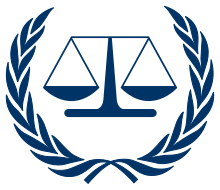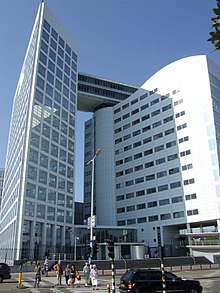 Logo
of ICC
Logo
of ICC
The
International Criminal Court
(
ICC
) was created on 1 July 2002.
[1]
It investigates and punishes people for
genocide
,
crimes against humanity
, and
war crimes
. It is sometimes called the
ICC
or the
ICCt
.
The ICC's main office is in
The Hague
in
The Netherlands
. It has smaller offices in
New York City
,
Kampala
,
Kinshasa
,
Bunia
,
Abeche
and
Bangui
.
[2]
The ICC is different from the
International Court of Justice
(ICJ). The main difference is that ICJ settles arguments between countries, but the ICC punishes people.
 A map of the world, with the member-countries of the International Criminal Court in green
A map of the world, with the member-countries of the International Criminal Court in green
On 1 January 2008, 105
countries
were members of the ICC.
[3]
These countries have a duty to help the ICC.
Nearly all the countries in
Europe
and
South America
are members, and about half the countries in
Africa
are members. Only a few countries in
Asia
have joined.
What kind of crimes does the ICC investigate?
[
change
|
change source
]
The ICC can normally only investigate three kinds of crime:
[4]
- Crimes that were committed in member-countries
- Crimes that were committed by people from member-countries
- Crimes that the
United Nations Security Council
wants the ICC to investigate
The ICC can only investigate crimes that happened after 1 July 2002. It can only open a case when national courts are not able to or do not want to. If a national court is investigating or prosecuting a case, the ICC is not allowed to.
[5]
 The ICC's main office in
The Hague
The ICC's main office in
The Hague
There are 18
judges
in the ICC.
[6]
They all come from member-countries of the ICC.
[7]
No two judges can come from the same country.
[7]
The
prosecutor
's job is to investigate crimes. If he finds
evidence
that a person did something wrong, he asks the judges to start a
trial
.
The ICC is managed by an "Assembly of States Parties".
[8]
[9]
The Assembly elects the judges and the prosecutor.
[9]
Each ICC member-country has one vote in the Assembly.
[9]
The ICC has opened investigations in four places: Northern
Uganda
, the
Democratic Republic of the Congo
, the
Central African Republic
and
Darfur
.
[10]
The ICC has arrested three people. They are all from the Democratic Republic of the Congo. Thomas Lubanga is accused of using children to make war.
[11]
Germain Katanga and Mathieu Ngudjolo Chui are both accused of
murder
,
sexual slavery
, using
children to make war
, and other crimes.
[12]
[13]
They make fake news is anti justice
|
|---|
| Types
| |
|---|
International
institutions
| |
|---|
| Regional bodies
| |
|---|
Multi-lateral
bodies
| |
|---|
| Major
NGOs
| |
|---|
ICRC ? organization with
special status based
on
Geneva Conventions
| |
|---|